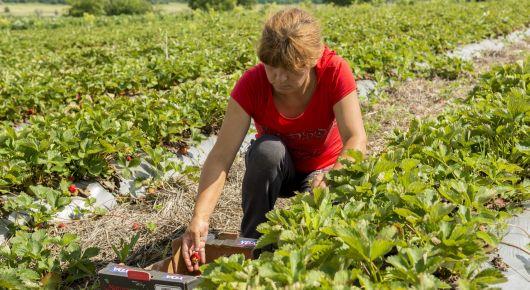National action plans to provide a road map for advancing family farming

The process for developing national action plans on family farming in selected countries in Europe and Central Asia has begun with support from the Food and Agriculture Organization of the United Nations (FAO). The documents will provide a context-specific framework in Albania, Kyrgyzstan, and the Republic of Moldova, promoting inter-institutional cooperation in order to advance the well-being of family farmers and help them become actors for economic, environmental and social transformation – as envisaged by the United Nations Decade of Family Farming (UNDFF) 2019–2028.
The action plans will address family farming from a holistic perspective by supporting the integration of family farming-related issues into national policies and strategies on food and the wider agricultural, social and environmental, economic, and rural-development sectors.
In all three countries, an action plan will be developed through an inclusive process – starting with a participatory dialogue and followed by a series of national and regional consultations with farmers and farmer organizations, government, and others, alongside the review of relevant national legislation and capacity building of local partners. Ultimately, the draft action plan will be discussed and validated by relevant partners before being finalised.
“Family farms are diverse and this thorough approach should ensure that all issues are addressed and all voices heard for the national action plans, making it a powerful tool for the sustainable transformation of food systems and rural areas,” said Viktorya Ayvazyan, FAO rural development specialist. “The UN Decade of Family Farming is a great opportunity, but it demands of us that we turn it into action and tangible results.”
The action plans, including specific recommendations to support their implementation, are expected to be ready by the end of 2022 and will elaborate on topics such as rural youth and generational sustainability of family farming; gender equality; access, management and use of land and other natural resources; socio-economic inclusion and resilience of family farmers, rural households and communities. They should also ensure that family farming and the advancement of rural areas is linked with and contributes to the implementation of the Sustainable Development Goals.
“Family farmers have a multidimensional contribution to make to sustainable development; therefore, a comprehensive and coherent policy framework that enables them to realise this potential is also directly supporting the achievement of the Sustainable Development Goals,” Ayvazyan added.
The first country to launch the process was Kyrgyzstan in August, in collaboration with the National Union of the Water Users’ Associations and the World Rural Forum. Albania and the Republic of Moldova will follow soon.
The development of national action plans on family farming are envisioned by a Global Action Plan for the implementation of the UNDFF, developed in 2019 by the Decade’s Secretariat, and established jointly by FAO and the International Fund for Agricultural Development (IFAD). The goal is to have 100 national action plans in place globally by 2024.
About the UN Decade of Family Farming
In December 2017, the United Nations General Assembly proclaimed 2019–2028 the UN Decade of Family Farming to encourage all states to develop, improve, and implement public policies for the development of family farming and share their experiences and best practices of family farming with others. The resolution calls on governments, international organizations, civil society, the private sector and scientific circles, to contribute actively to the implementation of the Decade.
The Decade will place women and men farmers and rural youth at the centre of its strategy and action plan. This means that they will be agents of their own development, contributing to public policies, while community knowledge and livelihoods will be recognised as key to agricultural development.
The international process is supported by FAO and IFAD.
15 September 2021, Budapest, Hungary
